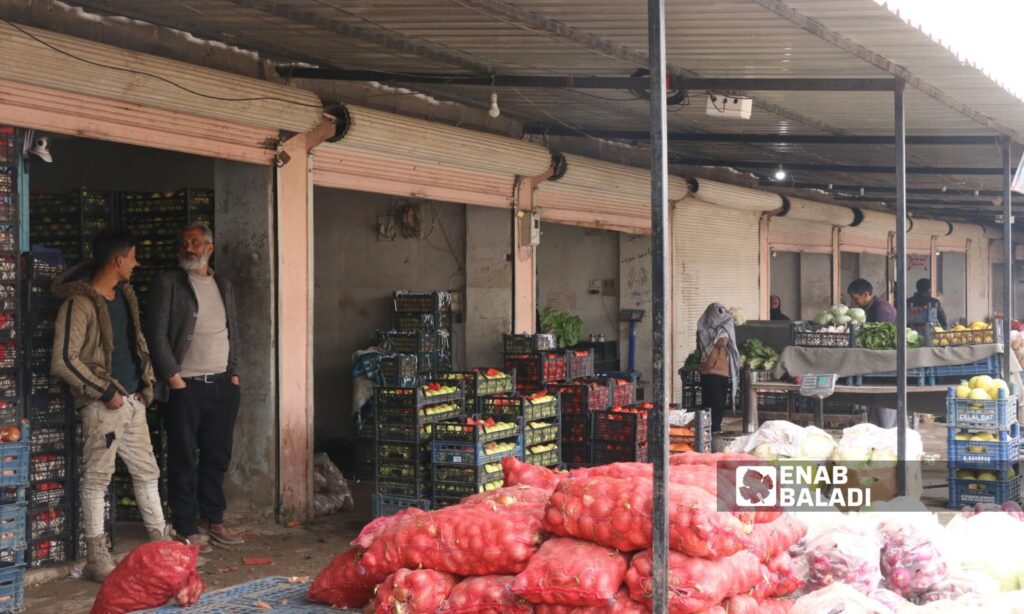Enab Baladi – Ras al-Ain
The markets in Ras al-Ain, northwest of al-Hasakah, are witnessing a surge in vegetable prices, reaching up to 100% in some varieties compared to the previous month.
The price hikes are affecting a large segment of the city’s population, which totals 115,000, amidst a low economic and living standard. The majority of residents work in agriculture or daily labor, earning a daily wage that does not exceed 30,000 Syrian pounds (around two US dollars).
The price per kilogram of tomatoes has reached 18,000 Syrian pounds, eggplants 14,000, potatoes and onions 12,000, and zucchinis 11,000.
Market vegetable leftovers
Azzam al-Sukhni, a daily wage worker in Ras al-Ain, expressed his frustration with the soaring vegetable prices, considering them unsuitable for the city’s laborers, who earn a daily wage of no more than 30,000 pounds, with the vegetable prices calculated for them in Turkish currency.
He clarified that the rise in vegetable prices has transformed them from an affordable commodity to an unattainable one, posing a burden on families, especially the impoverished and those with limited income.
Fatima al-Saman, a mother of five in Ras al-Ain, said that her family has been deprived of vegetables due to the price hike, having to go to the market at the end of the day to buy leftover vegetables because they are cheaper.
She explained that the leftover (old) vegetables are only suitable for immediate cooking and do not last even for a few hours.
Despite the lady’s fears regarding the impact of low-quality leftover vegetables on her family’s health, she is forced to cook them with no other option, as she told Enab Baladi.
Low sales and high fees
Malik Aziz, a vegetable shop owner in Ras al-Ain, stated that the surge in vegetable prices has adversely affected shop owners, leading to declining sales.
He told Enab Baladi that the shop used to sell no less than 900 kilograms of vegetables of various kinds daily in the summer, but currently, the sales do not exceed 100 kilograms in winter.
He added that shop owners purchase vegetables from traders in Turkish currency (1 US dollar equals 14,300 Syrian pounds and 29.77 Turkish lira) and sell them to residents in Syrian pounds, negatively impacting profit margins.
Aziz noted that it is the traders who determine vegetable prices, deeming the current prices to be excessively high, resulting in the loss of most of his customers.
Mazen Mekdad, a vegetable trader in Ras al-Ain, explained to Enab Baladi that the price hike is caused by the unavailability of locally grown vegetables in the winter season, prompting the area to rely heavily on imports from Turkey.
He stated that the cost of transportation, unloading, and Turkish customs fees reaching up to 200% contributes to the price surge.
Ras al-Ain and Tel Abyad are located between the Turkish border and the areas under the control of the Syrian Democratic Forces (SDF), with no official crossings between them. The Tel Abyad crossing between Turkey and Syrian territories is far from Ras al-Ain.
There are three currencies in Ras al-Ain, with the Syrian pound being the currency in circulation, but its unstable situation and unprecedented depreciation have burdened the residents. The second currency is the Turkish lira (not widely circulated) due to the city’s proximity to the Turkish border, and the third is the US dollar.
Ras al-Ain relies on vegetable cultivation during the summer season, including cucumbers, tomatoes, eggplants, and okra. Despite the importance of these crops, the absence of plastic greenhouses and official support presents an obstacle, given their high cost and the scarcity of expertise in their construction in the region.
It is worth noting that Ras al-Ain’s soil is suitable for cultivating various types of crops.

